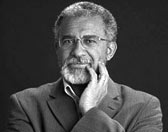Veritas Corpus

What did I learn? Truth in search of the body. The body in search of truth. I like to think that the three days of encounter in the theater department has raised my excitement about corpo-logical thinking. The very act of being silent, as most of the assignments took place, gave enormous opportunity for intellectual processing. Statuesque poses are not simply beautiful shapes of line, space, and representational form to the observer. Instead, the tension of making the muscles do things outside our everyday repertoire of movement and gestures, has the enormous, hidden (and to me until now) intellectual activity. The processing of thoughts while the body is in shapes other than its everyday use, is an intellectual exercise that leads to deep emotional response, to posing questions, to reflecting on the issues at hand. When the exercise of unselfconscious release to commitment in the search of truth leads one, there is a discovery of the mind and the body which calls one to deeper and deeper reflection. Talking about this point can never comprehend the depth of this experience, unless one has subjected the body to experience the commitment in the search of truth.
One is reminded to use the most basic function of existence; breathing. The mind, despite the anxiety of one’s self-awareness in the workshop exercises drives one to adapt, adjust, trust, and allow the body to dictate the next move. This relegation of authority from the mind to the body is a different way of thinking, of searching for truth! For the first time I understood why dance therapy’s focus on authentic movement relegates expression to the body, when the mind drives in negative directions.
The body provides intellectual therapy. A search for healing is not for correcting pathology only. It can serve goals for the healthy mind, too: oppression, liberation, reconciliation, comfort, anger, and the wide range of the human emotions. Little wonder that the ancient Greeks place the oppositional masks of laughter and crying as the extremes of this panoply of emotions. This workshop brought me into direct conversation with my own emotional repertoire.
Rarely did I recognize the power of role reversal. In the oppression exercise, I was reluctant to serve as an oppressor. At the same time, the mental processing that I did in taking on the role of the oppressor, revealed something deeper about my own psyche! I met the enemy, and the enemy was me! Sincerity and pretense in the role of acting produced unexpected results: in pretense, the mind plumbs the depths of meaning in that moment of acting.
Our small attempts in the workshop were translated into viewing exceptional professional acting. Going to two very different professional plays made our feeble attempts at play-making seem so relevant. The high level of professional acting reaffirmed one’s admiration for the art form. But this time, my observation was so much richer, thinking from the vantage points of the performer.
In closing, I should mention the spirit of collaboration, sensitivity, and mutual respect among the instructors showed a kind sincerity. I wish that we can spread this theater workshop as a form of Faculty Development, to spread a sense of reversal thinking, substitutionary thinking, substitutionary positioning of the I and Thou among us as colleagues.
Contact Us
Center for Applied Christian Ethics
117 Blanchard Hall
501 College Ave
Wheaton, IL 60187
